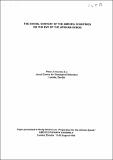August 1992 Case Study: The Social Context of the Amecea Countries on the Eve of the African Synod

View/
Date
1992-08-30Author
Jesuit Centre for Theological Reflection
Type
Case StudyLanguage
enItem Usage Stats
64
views
views
14
downloads
downloads
Abstract
What seems to me to be very important to focus or) in both the First and the Second Independence is the role of the church. Correct me if I am mistaken, but is it not true to say that the church especially the official church of bishops and clergy was by and large absent front leadership roles in the struggle for the First Independence? There are surely exceptions to this generalization, but on the whole the church did not appear as a major player in the Independence struggle of the 1960's. This might be explained for a number of reasons, but at least two reasons were (1) the officials to the church were largely expatriates, themselves frequently associated by origin, and occasionally by attitude, with the colonial powers; and (2) this was a per-Vatican church without the theological premise and pastoral practice of Gaudium et Spes, with an eschatological model which could subsist without active engagement in the social context of its day.
Description
Today, however, during this moment of the Second Independence, the church in Africa is quite active in the struggle, with leadership, laity, letters, etc. Look at the West African scene, where in countries such as Benin, Togo, Congo, Zaire, the national conferences those assemblies of national sovereignty a.re chaired by prominent members to the church hierarchy. The courage these very days during which we meet of Archbishop Monsengwo, chair of the Zaire National Assembly, is well-known. lulere in our AMECEA countries, the challenging pastoral letters to the bishops of Kenya, Uganda and Zambia have played and continue to play key roles in the movement toward democracy.